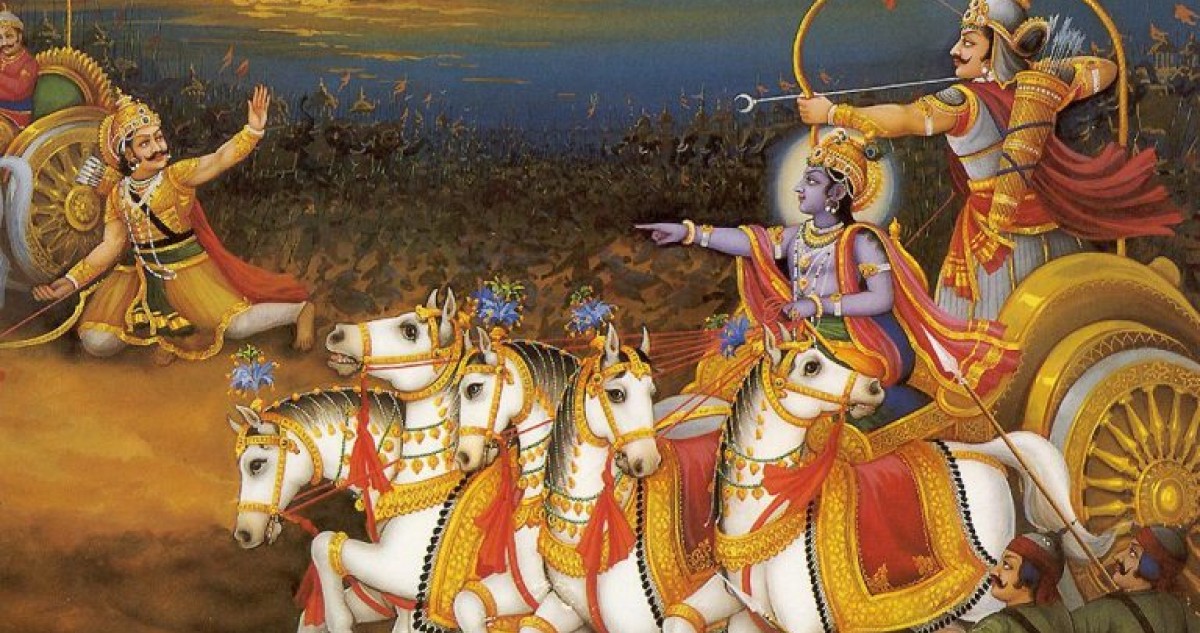No products in the cart.
The Karna Parva, or the Book of Karna, is the eighth book of the 18 books of the Great Hindu Epic, the Mahabharata. This parva is not divided into sub parvas and consists of 96 chapters and almost 5000 shlokas. It contains details accounts of the 16th and 17th day of the 18 day war, when Karna was the commander in-chief of the Kauravas army. The detailed summary of the Karna Parva is:
When Sanjaya narrated about the death of Dronacharya to Dhritarashtra, he was very grieved at the defeat of both Bhishma and Drona. He was distressed at the death of the great archer Drona. After the slaughter of Drona, all the warriors of the Kuru army started fleeing from the battlefield, as the death of their skilled commander in chief had greatly demoralized them. Duryodhana returned to the camp to take charge of the situation and make further plans. He uplifted his army men by giving them speeches of their duties as a warrior. Then, he chose Karna as the commander in-chief of the Kaurava army, as he was the greatest warrior of their side with all kinds of virtues instilled in him. He was young, ferocious and hungry to defeat the Pandava brothers. Unlike Bhishma and Drona, he possessed no soft corners for the Pandava brothers. He possessed a deep-rooted hatred for Arjuna and wanted to kill him in a one on one fair battle. All these qualities along with the determined mindset in Karna, made him the apt choice as commander, according to Duryodhana.
Karna devised a new strategy for the Kaurava army 16th day onwards. Even the Pandavas realized that the Kauravas were left with only one warrior, none other than Karna himself. The strategy of the Pandavas became centered around Karna, as they knew that they would victorious in the war, by defeating Karna. Karna, the great archer started destroying the Pandavas army with absolute precision.
One of the major face off in this Parva is the fight between Arjuna and Ashwatthama. He challenged Arjuna and attacked with arrows and divine weapons. Arjuna obstructed the attack of these weapons on him and his charioteer with his sharp arrows. Arjuna shot arrows at Ashwatthama’s chariot and horses and destroys them. This made Ashwatthama run away from the vantage point and he never again thought of challenging Arjuna.
Another great battle in this Parva is the face-off between Karna and Nakula. Nakula fought Karna with grit and determination, though Karna was a far better, intellectual and skilled warrior than Nakula. They both threw arrows to each other and even destroyed each other’s army gravely. During their fight, they also attacked each other’s armies and destroyed them brutally. However, after a great fight between them, Karna broke Nakula’s bow and killed his charioteer. Karna would have killed Nakula, but he didn’t after recalling his promise to Kunti that he would kill only Arjuna of the five Pandava brothers.
The war between the two armies had become even more intense and terrific after Karna took over the reins of the Kaurava army. Another major fight described in this Parva was the face-off between Yudhishthira and Duryodhana. They hurled a lot of arrows at each other.
Duryodhana even used his special weapon Sakti to destroy Yudhishthira, but he countered it easily. Thereafter, Yudhishthira attacked him with a mesh of arrows that caused Duryodhana to faint. However, he regained himself and again attacked him with a mace. Yudhishthira again countered him and attacked his chariot. Duryodhana fell from his chariot and fainted again. He was then taken back to the camp.
Even under Karna’s leadership, the Pandavas army, especially Arjuna destroyed everyone with his arrows. By the end of the 16th day, the Pandavas felt that they were inching closer to victory. At the end of the 16th day, after realizing the havoc created by Arjuna, Karna decided and vowed to Duryodhana that he would kill him the next day under all circumstances.
The 17th day of the war begun with Bhima’s dominance over the Kauravas army. Bhima even dominated in his battle against Karna, so much so that Karna took a break in his chariot at a secluded place. Arjuna, on the other hand, vowed to Yudhishthira that he would kill Karna and take his side to victory.
The second last day of the war, was packed with close battles across the armies. Bhima defeated Dussasana after engaging in a fierce battle with him. Bhima even killed him as a revenge to the ill deeds done by him in the past.
Another of the major fights on that day was the war between Karna’s son, Vrushasena and the Pandava brothers. Vruhasena attacked all of the brothers with arrows, even Krishna. Dhanunjaya got angry and killed Vruhasena using ten arrow that destroyed many of his body parts. Karna was grieved at the sight oof his dead son and his determination to kill Arjuna became even stronger.
Thereafter, Arjuna and Karna engaged in the fiercest of battles in Hindu mythology. The Epic battle is still the most talked about fights in the history of ancient Hindu Mythology. Karna was the only warrior in the entire Kuru army who had the skills and determination to give Arjuna a tough fight to remember. During the course of their fight, Karna had gained the upper hand. During their fight, Karna’s chariot wheel sank into the earth. However, Karna fought valiantly even in his tilted chariot. There was a moment in the battle when Arjuna fainted, and Karna used this opportunity to get down of his chariot and take out his wheel. Arjuna got up at this moment and seized this opportunity to attack Karna. He killed Karna using his Anjalika Astra by cutting his head. Thus, Arjuna used an unjust way to kill Arjuna as Krishna told him that Karna and Duryodhana had already broken enough laws and believed that Karna had lost the right to be fought like a warrior. Hence, Arjuna willingly killed Karna in his moment of distraction from the war. The death of Karna is the most significant event in the Mahabharata as it seals the fate of the Kaurava army defeat.

18 Parvas of Mahabharata
1. Adi Parva (the Beginning)
2. Sabha Parva (the Assembly Hall)
3. Vana Parva also Aranyaka-parva, Aranya-parva (the Forest)
4. Virata Parva (Virata)
5. Udyoga Parva (the Effort)
6. Bhishma Parva (Bhishma)
7. Drona Parva (Drona)
8. Karna Parva (Karna)
9. Shalya Parva (Shalya)
10. Sauptika Parva (the Sleeping Warriors)
11. Stri Parva (the Women)
12. Shanti Parva (Peace)
13. Anushasana Parva (the Instructions)
14. Ashvamedhika Parva (the Horse Sacrifice)
15. Ashramavasika Parva (the Hermitage)
16. Mausala Parva (the Clubs)
17. Mahaprasthanika Parva (the Great Journey)
18. Svargarohana Parva (the Ascent to Heaven)






